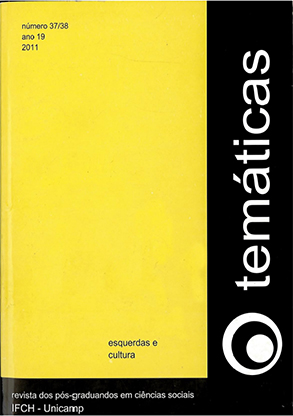Abstract
Protest song dominated the brazilian cultural scene from the early 60’s, in the context of social reforming movements, until 1968, when was decreed the AI-5. It was present in the TV’s Festivals, plays, movie soundtracks. The proposal is to observe this process from the analysis of the use of protest song in the plays of the “Grupo Opinião” (1964-1965). In one hand, researchers analyze such plays as a continuity of the politico-cultural project of the CPC (Centro Popular de Cultura – Popular Center of Culture) of the UNE before 1964, which searched in the “folklore” elements for the creation of a genuine and fair nation. Second, the blockbuster obtained helped in consolidating the relationship between art and engaged market, which he objected. From the songs that make up these shows, I seek to grasp the social discourse of the young left-wing groups that stirred the political and cultural scene during the 60’s and the relations between politics and culture.
References
BAKHTIN, Mikhail M. Questões de literatura e estética. São Paulo: Hucitec, 1988.
BENJAMIN, Walter. O autor como produtor. In: KOTHE, Flávio (Org.). Walter Benjamin: sociologia. São Paulo: Ática, 1985, p. 187-201.
BETTI, Maria Silvia. Crítica norte-americana e debate cultural no teatro brasileiro na década 1960/70: apontamentos introdutórios. Aurora, 1, revista eletrônica Neamp/PUC São Paulo, p. 53 – 71, 2007.
CHAUÍ, Marilena. Seminários. Col. O nacional e o popular na cultura brasileira. São Paulo: Brasiliense, 1983. 106 p.
COSTA, Iná Camargo. A hora do teatro épico no Brasil. Rio de Janeiro: Paz e Terra, 1996. 233 p.
DAMASCENO, Leslie H. Espaço cultural e convenções teatrais na obra de Oduvaldo Vianna Filho. Campinas; Unicamp, 1994. 333 p.
ESTEVAM, Carlos. A questão da cultura popular. Rio de Janeiro: Tempo Brasileiro, 1963. 115 p.
HOLLANDA, Heloisa Buarque. Descobertas, desastres e sonhos dos anos 60. In: Praia Vermelha, Estudos de Política e Teoria Social, PPGSS/UFRJ, Rio de Janeiro, 18(2), 2008.
RANGEL, Flávio.; FERNANDES, Millor. Liberdade Liberdade. Porto Alegre: LPM, 1977.
SODRÉ, Nelson W. Quem é o povo brasileiro. In: Introdução à revolução brasileira. São Paulo: livraria ed. Ciências Humanas, 1978. 258 p.

This work is licensed under a Creative Commons Attribution-NonCommercial-ShareAlike 4.0 International License.
Copyright (c) 2011 Mariângela Ribeiro

